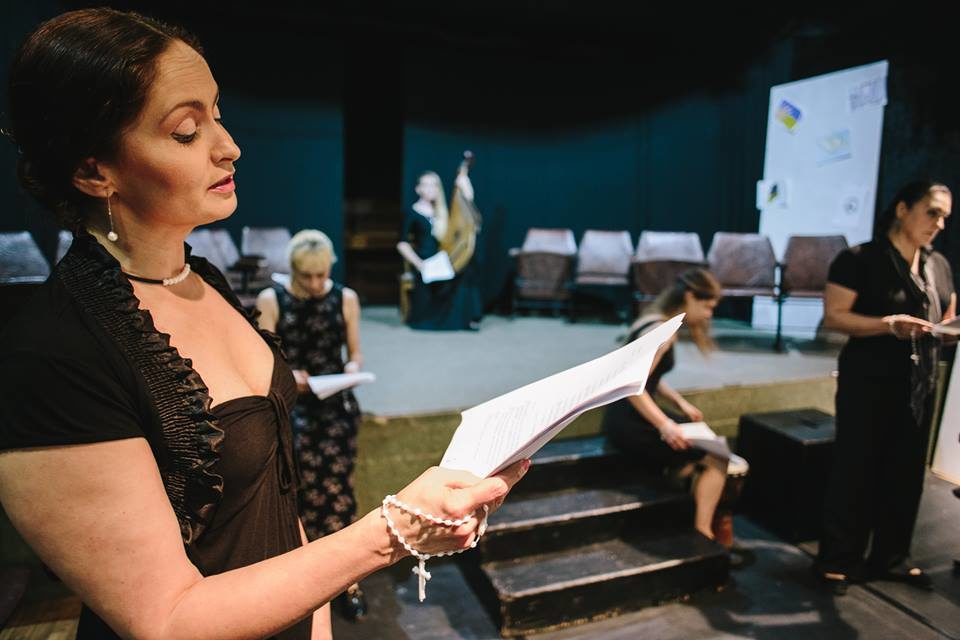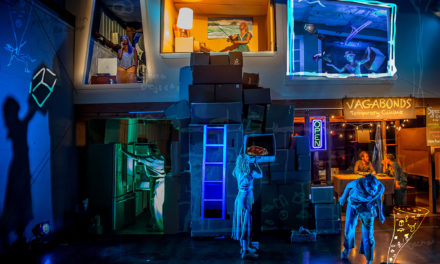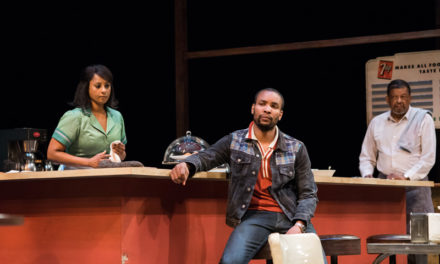Theater Vinora shows Women’s Voices, performance with elements of storytelling, based on real monologues by refugees from Donbas region. It was a very important step on the way to share a common pain of modern war.
The show put issues of identity and diversity to the fore.
The Vinora’s show commissioned by Kharkiv Center of Gender Culture with the support of the France Embassy and United States Institute of Peace and curated by the director of Vinora theater Iryna Kobzar.
Civic responsibility
Kharkiv has a lot of different professional and amateur theaters. One of them Vinora–poetic theater. It is run by a general and artistic director Iryna Kobzar. She is also a famous teacher of scenic speech at the Drama Faculty at the Kharkiv National University of Arts named after I. P. Kotlyarevsky. Her students are regularly ranked first at national contests. Vinora troup is open to everyone. It consists of office managers, musicians, IT specialists, teachers, sudents, etc. For the last performance, Women’s Voices Iryna Kobzar gathered very strong company, Oksana Stetsenko, Tetyana Grinik, Tetyana Turka majored actresses of Kharkiv National drama theatre as well as the student of the Drama Faculty Diana Kaladarishvili, bandura player Yaroslava Dzerevyago (bandura is a Ukrainian folk music instrument) and a bishop, who had been at war in Donbas for two years and shows his photo archive of ruined Ukrainian homes. Actors read monologues with acoustic accompany by bandura. In square mise-en-scene all can see faces of actors, and authors, women from Donbas who wrote the monologues. But the silence between texts and darkness between photo projections was the immersive representation of pain and ruined destinies of these women.
Women’s voices of Donbass: explores identity and conflict.
After four years of continuous war in Donbas, Ukrainian society is going through a painful transformation. Therefore, the modern theater tries to solve current problems acquiring more and more socio-realistic features, using documentary materials and facts. A form of documentary theatre, in one hand, shoots the aim of therapy and adaptation for women who escape from war, and in the other hand, it is a powerful speech for humanity and charity on Ukraine stage. Monologues were written by four refugees who have left their homes and find new life here in Kharkiv.
There is no question why this is happening here and today. The social and political responsibility of state theaters is a big question in Ukraine. But in Women’s Voices, we can see major actors of academic theaters which mastery and delicacy delving into this project. Such dedication helps us to believe in a new level of intellectual and humanity communion.

Photo: Pavlo Pahomenko http://www.mediaport.info
Culture is a great tool for societal transformation
Small nongovernmental theater “Vinora” with a group of professional actors from National academy drama theater make the very important show. Its value is not only as performance but as a сivic gesture. Talking about war with the language of names and individuals but not numbers and statistic is very important. Such initiatives have a huge impact. They help people cope with the stress they are experiencing. When the conflict cannot be avoided, suppressing the emotions that it causes is very harmful. Any form of expression will benefit. The only way to get out of a suppressed state is to talk about what’s worrying, to express through art, to somehow share your feelings. Such performances help refugees and victims to increase participation in cultural and social life as well as to promote intercultural dialogue and ethnic diversity.
Women’s Voices was no the only example of “fact theater,” but very humanistic step either. It’s hard to be a man when war is on the porch, but much harder to be a woman.
Gender problem is on the top now. But all that we can see is consistent suppression of women’s experience is not because their fates are less heroic or tragic, but because they are feminine.
Hoping and seeking happiness is a very basic and very human thing it’s about compassionate and love. Such performances makes us closer one to other, help bring individuals and people together.
Small place of Vinora theater wasn’t enough room for all visitors so organizers promised to repeat the show.
This post first appeared on Ukrainian Theatre on June 8, and has been reposted with permission.
This post was written by the author in their personal capacity.The opinions expressed in this article are the author’s own and do not reflect the view of The Theatre Times, their staff or collaborators.
This post was written by Veronika Skliarova.
The views expressed here belong to the author and do not necessarily reflect our views and opinions.


















